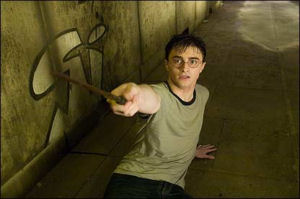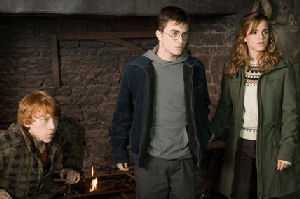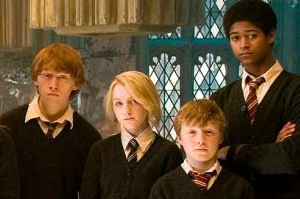 Director: David Yates
Director: David Yates
Writer(s): Michael Goldenberg (Screenplay), J.K. Rowling (Original Novel)
Starring: Daniel Radcliffe, Emma Watson, Rupert Grint, Michael Gambon, Alan Rickman, Imelda Staunton
Running Time: 138 mins approx.
Rating: 12A
On Release: Out Now!
Synopsis
Harry Potter is reunited with his godfather, Sirius Black, and a host of familiar faces – not all of them pleasant — as he is introduced to The Order of the Phoenix, a group set up by Albus Dumbledore to fight Voldemort and his followers, the vicious Death Eaters. Meanwhile, Harry returns to Hogwarts School of Witchcraft and Wizardry to find a world in disarray; whilst those closest to him don’t doubt that Voldemort has returned from death, the rest of the wizarding world is another matter entirely, thanks to a relentless smear campaign from the Ministry of Magic. If this wasn’t bad enough, the Ministry is also interfering at Hogwarts itself, appointing the twee yet ruthless Dolores Umbridge as Defence Against the Dark Arts teacher, Harry is having vivid dreams that seem connected with Voldemort’s plans, and Dumbledore seems to be maintaining his distance. With all this to worry about, the impending O.W.L. Exams are the least of Harry’s worries…
Review
 Fans of the HARRY POTTER novels always level the same complaints at the movie adaptations; too short, scene X was changed, character Y didn’t appear, sub-plot Z was dropped completely, the reminding story felt too rushed. And yet every film in series has at the very least worked as a stand-alone movie, maintaining a parallel continuity very similar yet not identical to the books and helping to forge a following away from the source material. Whilst shallow and irritatingly twee under the hand of director Chris Columbus, the latter entries in the series have acquitted themselves wonderfully, achieving that balance of wonder, adventure and drama which permeate J.K. Rowling’s novels from start to finish – thanks mainly to two canny choices of director. So how does David Yates, best known for more realistic, small-screen fare like THE BILL, fare as helmer of the darkest Potter to date?
Fans of the HARRY POTTER novels always level the same complaints at the movie adaptations; too short, scene X was changed, character Y didn’t appear, sub-plot Z was dropped completely, the reminding story felt too rushed. And yet every film in series has at the very least worked as a stand-alone movie, maintaining a parallel continuity very similar yet not identical to the books and helping to forge a following away from the source material. Whilst shallow and irritatingly twee under the hand of director Chris Columbus, the latter entries in the series have acquitted themselves wonderfully, achieving that balance of wonder, adventure and drama which permeate J.K. Rowling’s novels from start to finish – thanks mainly to two canny choices of director. So how does David Yates, best known for more realistic, small-screen fare like THE BILL, fare as helmer of the darkest Potter to date?
 Perfectly, as it happens. Yate has a fantastic eye for palette, painting most of the film in muted tones that befit and highlight Harry’s sense of fear, isolation and depression. In the story’s rare happy moments, however, the screen is an explosion of colour and light, underlining the shift in emotional focus with sheer visual joy. All of this is ably helped along by a sterling cast — the younger actors have finally grown into their roles, banishing forever the memory of the wooden, RADA-voiced performances that (Grint aside) made us all cringe throughout THE PHILOSOPHER’S STONE and THE CHAMBER OF SECRETS. The icing on the cake, however, is Imelda Staunton, who so perfectly captures the insipid Dolores Umbridge that you’ll want to throttle her every time she bustles on-screen. The only bum note, in fact, is Michael Gambon, who still plays a militant, harsh-toned Dumbledore completely bereft of the late Richard Harris’ quiet charm and measured gravitas; quite frankly it damages the film to have him barking and snarling his way through a part which was so perfectly cast beforehand.
Perfectly, as it happens. Yate has a fantastic eye for palette, painting most of the film in muted tones that befit and highlight Harry’s sense of fear, isolation and depression. In the story’s rare happy moments, however, the screen is an explosion of colour and light, underlining the shift in emotional focus with sheer visual joy. All of this is ably helped along by a sterling cast — the younger actors have finally grown into their roles, banishing forever the memory of the wooden, RADA-voiced performances that (Grint aside) made us all cringe throughout THE PHILOSOPHER’S STONE and THE CHAMBER OF SECRETS. The icing on the cake, however, is Imelda Staunton, who so perfectly captures the insipid Dolores Umbridge that you’ll want to throttle her every time she bustles on-screen. The only bum note, in fact, is Michael Gambon, who still plays a militant, harsh-toned Dumbledore completely bereft of the late Richard Harris’ quiet charm and measured gravitas; quite frankly it damages the film to have him barking and snarling his way through a part which was so perfectly cast beforehand.
Sadly, however, Gambon doesn’t represent the film’s only flaw – and the rest can be placed squarely on the shoulders of new Potter screenwriter Michael Goldenberg (PETER PAN, CONTACT). As patchy as Steve Kloves’ adaptation work has been – and let’s face it, you either love his Potter scripts or hate them – Goldenberg’s is patchier, nailing the characters and dialogue flawlessly but turning in a sloppy, stitched-together plot. Certain cuts — like the omission of Dobby the House-Elf, Rita Skeeter and Snape’s use of the Penseive — are understandable, others defy logic. Why, for example, go to the trouble of including the despicable Kreacher and the foul-tongued portrait of his mistress if the former doesn’t do anything despicable and the latter barely utters a word? If neither are deemed crucial to the plot (and arguably they are, as any fan of the book will tell you) why include them at all? Why introduce important new characters from the book, like the wonderful Tonks, and not even name them on-screen, much less give them much to do? And yes, the overall plot *does* feel rushed, somehow moreso than THE GOBLET OF FIRE despite the source novel having far more un-necessary padding than its predecessor.
And so our final product is a bittersweet affair, capable of delighting and irritating fans in equal measure. Due to the story’s highly depressing tone, parents of younger children should perhaps view the film before taking them along, but everyone else should find plenty to enjoy — despite its flaws it’s still a great way to spend a Saturday afternoon.
Matt Dillon
